- Home
- Ellen Datlow
The Green Man Page 17
The Green Man Read online
Page 17
Of all the things and people I was maybe going to have to leave behind in Idaho, the piano was what I worried about missing most.
So it was significant that Vernon had bought a piano for me before he even knew me.
On the other hand, his psychology practice had to be doing pretty well for him to afford this fabulous house on practically the most expensive real estate in the world. So what was one piano more or less to him?
If it was a bribe, it was a really beautiful bribe.
I sat on the piano bench, glanced at Vernon. He nodded. I slid the key cover back and looked at the keys. This was not a brand-new piano. The keys had yellowed with age, but they weren’t chipped on the edges the way the keys were on the practice pianos at school. I placed my hands two octaves apart and set my fingertips down. Silky smooth ivory, yum, and lovely ebony. I played Hanon’s Keyboard Exercise #2, which is not an exciting piece of music, but it lets you hear a lot of different notes in the course of it, since it moves up and down the keyboard.
Something inside me swelled up, pushed against my throat. The sound was beautiful, the action perfect. I finished the exercise and let my fingers choose what came next. They picked Chopin, one of the waltzes. I dropped into the altered state where music takes me.
A while later I stopped playing and blinked. I knew a few things then. One, I could be bought. Two, I could move here as long as the piano was here, because while I was playing, I lost track of everything else: no worries. If I could achieve that state here, I would be all right, no matter what else happened.
Only, would they be able to stand it, the potential new family? Not everybody loved music.
I glanced around. Tam and Holly sat on this big puffy couch next to a giant philodendron. They both stared at me, their mouths open.
Mom and Vernon sat on a loveseat, their hands tangled in each other’s.
It occurred to me that Dad hadn’t asked me to play for him since he left to marry Ginny. He hadn’t even come to my recitals. Out of town those weekends. But Ginny had come.
“Um,” I said. “Sorry.”
Vernon shook his head. “Don’t apologize for that. It was beautiful. Please play whatever and whenever you like.”
Tam jumped to his feet. “Can you teach me to do that? Dad just got the piano two days ago, and I tried it, and it didn’t sound like that at all! Could you show me—”
“Me too,” Holly cried.
“It takes a while to learn.” I left the unspoken question in the air: would we have a while?
I stood up. I was afraid I loved the piano too much. “Where’s the kitchen?”
We went down yet another hallway.
The kitchen was big like the rest of the house was big, with a giant steel refrigerator, hanging copper-bottomed pots, a wide butcher-block table, a six-burner stove, and two ovens, microwave and regular. I opened the fridge, and Mom said, “Fiona!” So I shut it, but not before I saw there were no soft drinks, no Kool-Aid, not even any milk.
“It’s all right,” Vernon said. “I want you to feel at home here. Tam, show Fiona where we keep the snacks.”
This was when the true horror of living with the Denyses hit me. Their idea of snacks was totally uncivilized. Carrots? Celery? Apples? Oranges? Fat-free microwave popcorn?
I was so glad I had brought a stash of Snickers and Reese’s peanut-butter cups.
“Which reminds me,” said Vernon. “After you guys get settled, we’ll go to the grocery store and pick up whatever you want to eat. I realize we may have different ideas of what makes good food.”
Another objection to our possible future sidestepped. This guy was good.
I got Holly to show me how to get back to my room, then unpacked, changed into a blue T-shirt, and snooped around. The drawers of the desk and dresser were empty until I put things into them. The closet held hangers and nothing else. The windows showed forest. There was a birdbath out there under the trees, but no lawn anywhere that I had seen from all those windows. And no pool either, unless there was more of the house and yard than I had seen already. Which wouldn’t surprise me.
I went across the hall and knocked on Holly’s door. She let me in. Her room was done in brown and red, with colorful pictures painted on bark hanging on the walls, and squat stone statues from other countries perching on the furniture. There was forest out her windows, too.
However. Not a Barbie in sight. It made me wonder; I mean, I had only retired my doll collection to the attic two years ago, and I still thought about them. Holly didn’t even have a teddy bear on her bed.
“So, what do you guys do for fun?” I asked my potential sister as I sat on her bed.
“Hike. There are trails out back, and lots of great places to drive to if you like hikes. Read. Go to the beach. Monterey has this great aquarium. We can take you there this week. In the summer, Daddy leads family retreats in the woods, and we get to go on those. Also, I paint.” She knelt in front of her desk, opened a deep drawer, and pulled out this silver box, like a briefcase but bigger. “Do you like to paint?”
“I suck at art.”
Her grass-green eyes widened. “Oh, no, Fiona. Nobody sucks at art. Maybe you just haven’t had the right teacher.”
Uh oh. Condescension alert. And from an eight-year-old. Where did I go from here? Sideways. “So, what happened to your mom?”
She bit her lip and worked on the clasps of her silver box. She slanted me a glance. “She died a couple years ago.”
I waited a second, then said, “What happened?”
She sucked air in through her teeth. “Cancer.”
“I’m sorry.” Because of Mom’s work, I knew a little about how awful that could be, or how well it could go. I didn’t know which kind of death Holly’s mom had had, and I didn’t think I should ask until I knew her better, if then.
She gripped the clasps on her box. “Daddy didn’t stop it,” she whispered.
“Sometimes there’s nothing you can do.” I wished Mom was with us. She knew how to talk to people about this stuff.
She stared past me, her eyes narrow. “She wanted to leave,” she whispered. “I heard them one time when they didn’t know I was there. Daddy told her he could give her the green, but she said she just wanted to rest, and he should let her go.” She glanced at me with wet eyes. “How could she leave us?”
“Death happens. You can’t stop it.” I thought about Mom’s client Peggy. I saw her twice before she died. She was one of the nicest people I had ever met. So calm. So not afraid.
Why?
She had touched my hand on the second visit. Her fingers were thin as sticks with plastic wrap stretched over them. Her eyes were full of shadows and light, and her smile was peaceful.
The day Mom told me Peggy died, I thought I saw Peggy walking away from me on the street. I don’t know how I knew it was her. Maybe because I was thinking about her, and Mom said she had died well. She had a full head of brown hair, not the stubble I had seen her with. She turned and waved to me, and I saw a distant house through her. Then she faded.
Holly shook her head. “Daddy could. She wouldn’t let him.”
“Holly—” I held out my hand.
Holly looked up suddenly, blinked, shook her head. Her blinding smile flashed, and she opened the clasps on her box. I dropped my hand to the bedspread.
She lifted the box’s lid, revealing a compartmented interior full of tubes of paint. She slid some flat canvas-covered boards from brackets in the box’s lid and held one up to show me.
It was a picture of a tree, or maybe a person, vivid, green, leafy and branchy, twisted and strange and powerful. It had eyes, and it stared straight into mine. I couldn’t look away.
“Do you like it?” she asked me after I tried to win a staring contest with a painting.
I shook my head.
Holly sighed and put the picture down. “That’s my best one.”
I shook my head again, trying to wake up. “Huh?”
“You don’t li
ke it.”
“Like it? It’s fantastic. You did that? You’re amazing.”
“Really?” She smiled. “Do you want it?”
“Holly—” I couldn’t let her give me presents. Not when I didn’t know how this was going to turn out.
Her smile crumbled.
“Sure, I want it,” I said. “I just thought—it’s too good to give to some stranger.”
“But you’re not a stranger. You’re going to be our sister.”
I bit my lip. “How can you be sure? What if it doesn’t work out between our parents? What about us? What if we hate each other?”
“But I don’t hate you. Do you hate me?”
“No, of course not. I don’t even know you.”
“Don’t you know right away if you’re going to hate somebody?”
“No.” It took me a while to hate someone. First they had to do something hateful and hurtful and mean. Usually after I liked them and thought they were my friend.
Holly sat on the bed and gripped my hand. Hers was cool and a little sticky. It was weird for her to just grab me like that. I wanted to pull away, but I waited. Maybe she had been brought up with different manners from mine.
She turned my hand over and traced some kind of sign on my palm with her fingertip. My hand prickled, and I had the taste of honeydew melon in my mouth, which confused me. Holly looked up at me. “It’ll be okay.” She sounded way too sure of herself for an eight-year-old.
Tam knocked on the open door. “Hey? You hungry?”
I licked my lips. I still tasted melon. My stomach growled way louder than I was comfortable with.
Tam laughed. “Come on down to the kitchen. Dad’s making lunch.”
A guy who cooked? Culture shock again. Sometimes I thought one of the reasons Dad remarried right after he left Mom was because he couldn’t find his way around a kitchen and would have starved to death without someone to cook for him.
Naw, scratch that, it was backwards. Dad left Mom because he already knew and wanted Ginny. Sometimes I almost hated him.
Holly picked up the painting and darted across the hallway to put it in my room. We all headed for the kitchen.
I heard Mom laughing, and Vernon’s voice. A popping, sizzling sound, something frying, and the smell of something good.
I paused in the living room. Everything was rushing by me again. A pang of homesickness tightened my throat. Everything I knew was so far away, even Mom, somehow.
“What are you worried about, Fee?” Tam asked.
I blinked. My friends at school called me Fee, but Mom never did. How come Tam knew my nickname? “What’s Tam short for?”
“Tamarisk.”
Okay, what the heck did that mean? Oh, well, as long as he was answering questions, why not try some of the big ones? “Why does your dad like my mom?”
“Your mom is great. How could anybody not like her?”
“That’s not what I mean.” I took a couple breaths. Could I actually ask the questions I hadn’t even let myself ask in the privacy of my own head?
If I didn’t ask now, I would drive myself crazy. “Yeah, everybody likes Mom, but nobody else asked her to marry him. Look at this place. You guys have everything. You live in California. There must be scrillions of women around here who would drop everything if your dad looked twice at them. How and why did he come looking for Mom? How’d he even find her?”
Tam shrugged. “It doesn’t matter where you live on the World Wide Web, only what languages you type in. People find each other. But if you really want to know, you should ask Dad.”
Holly took my hand. Hers was cool and still sticky, and I felt that weird prickling in my palm again. “Come on, Fee.” She tugged me toward the kitchen, and as I followed, my questions washed away. I felt like I could follow Holly anywhere and be happy.
“I don’t know if you’ll like this, Fiona,” Vernon said when we walked through the kitchen door. He was stirring something in a big black frypan on the stove, and Mom stood beside him, holding plates. “It’s vegetarian stir-fiy. If you can’t stand it, we have peanut butter and jelly and bread. What do you think?”
“It smells great.” It must have soy sauce in it; it smelled like Chinese food, which was one of my favorites. Holly drew me over to the kitchen table and sat me down. I felt weird and twitchy, but I didn’t know why. Part of me was happy, and the rest was trying to wake up.
She patted my shoulder. Happiness surged up. “Want some apple juice?” she asked.
“Sure,” I said.
She went to the fridge and got out a pitcher, then took glasses down from a cupboard.
Tam sat down next to me and took my hand. What was with these hand-grabbing people? I wanted to ask that out loud, but the words wouldn’t come. He stared at my palm the way Holly had, and like her, he wrote something on my hand with his index finger. This time the prickles in my hand were almost like needle stabs. The taste in my mouth was tangerines. My melon-Holly mood vanished.
“What are you doing?” I whispered.
“Getting to know you.”
That didn’t make sense. “How come it hurts?”
He stared into my face. “Does it? I’m sorry. I didn’t mean—” He raised my hand and kissed the palm, and I felt strange, but better.
Then I felt swamped in confusion. No boy had ever kissed any part of me before. No one I knew had even mentioned some boy kissing their hand, not even Amy, who said she had French kissed Zack Dolby once.
Was Tam hitting on me?
It was true we hadn’t met before, but weren’t we, sort of, almost related?
I looked for Mom. Had she seen? What would she think?
She had her eyebrows up, and she was definitely staring our way.
I jerked my hand out of Tam’s. His turn to look confused. Four expressions crossed his face, none of which I could read.
Then Holly brought juice to the table, and Vernon dished up the stir fry, and Mom passed out the plates, and Tam got napkins and chopsticks for everybody, after asking me and Mom if we liked to use them. We ate and talked. The food was really good—green peppers, red peppers, onions, soy sauce, this stuff called tempeh I had never had before, sliced water chestnuts, and mushrooms.
I finished first and watched the rest eat. I felt comfortable here.
In the afternoon, we went to a supermarket. It was twenty miles away, and it had the most beautiful produce I had ever seen. Everything looked like art: a pyramid of green peppers, a galaxy of oranges, crisp leaf lettuces arranged in a bouquet, fresh herbs in bunches. The store bakery sold ethnic breads, beige, black, brown, covered with sunflower seeds or com meal. The shelves were loaded with things labeled “organic” and “natural.” I could not find a single product made by Her-shey or Mars or Hostess.
Tam grabbed a box of licorice buttons, opened it, and fed me one. I mean, he put it in my mouth. I was weirded out by this. I didn’t even like licorice, and he hadn’t asked.
Then I fell into the flavor. I spent the rest of the shopping trip in a haze as I sucked on the licorice button. It was soft and tasted black, but not like your usual Twizzler, more strange and sharp, strong and somehow primitive.
It wasn’t until we got back to the house that I realized I hadn’t chosen a single grocery. Mom and Vernon had asked me if what they were choosing was all right, and I just kept saying “Sure.”
The last nubbin of licorice on my tongue vanished as we unloaded the car and took groceries in, and then I got mad.
“What did you do to me?” I asked Tam. We were in the entryway kicking off our shoes. Mom and Vernon and Holly had already unshoed and headed for the kitchen.
He pulled the box of licorice out of his shirt pocket and shook a button out, but I hit his hand and he dropped it. “Quit that!” I stooped and grabbed the little black dome.
“What is this stuff? How can they just sell it in a market? Is it some kind of drug?”
He put one in his mouth. “It’s just candy.”
“Don’t give me any more.”
“Didn’t you like it?”
“It made me zone out. I hate that. You made me zone out. Why? How?”
Tam picked up two bags of groceries and walked away from me.
I went to the piano and pounded out some Scarlatti, the one with all the double-handed octaves in a minor key. What did these creepy, beautiful kids want? What was their father doing to my mother?
What were we doing here?
When I finished crashing around on the piano, I looked up. Vernon sat in a nearby chair.
“Let’s take a walk,” he said.
We sat down side by side in the front entry and put our shoes on. I didn’t know where Mom was, or where Tam and Holly were. I didn’t care.
We crossed the bridge and went around the house to a trail that led off into the trees. The trail was carpeted with short tan needles, and the trees were tall and quiet, with dark furrowed bark that went up and up before the feathery dark-needled branches drooped from the trunks. The woods were cool and shadowy, and the ground felt soft. Our footsteps made very little sound.
We walked a long way without saying anything. The forest was so quiet—occasionally a bird called somewhere in the distance. We passed a stream so small it hardly trickled out loud.
Vernon stopped when we came to a fallen tree. Sunlight shone down through the hole in the canopy the tree’s falling had left behind. He went to the tree and stroked its trunk, like someone smoothing wrinkled bedcovers, then turned to me. “Want to sit?”
I sucked on my lower lip, then went and sat on the trunk. The bark was craggy, but the tree was so big around that it made a good seat. The air smelled like pine needles.
Vernon sat beside me.
We listened. Birds, a hush of breeze wavering the branches above us, the knock of a woodpecker somewhere.
“Why us?” I asked, eventually.
Then I looked at him.
He wasn’t there.
A branch spiked up from the trunk of the tree beside me, wide around at its base as a person. Twigs spread out from its top, and each one had a different kind of leaf on it, some feather-shaped, some like maple leaves, some needled, some like arrowheads or oak leaves or teardrops.

 Inferno
Inferno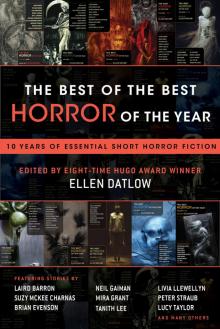 The Best of the Best Horror of the Year
The Best of the Best Horror of the Year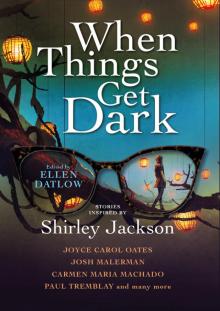 When Things Get Dark
When Things Get Dark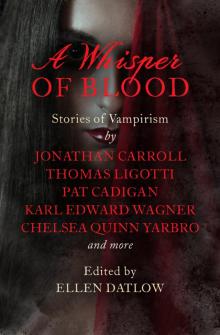 A Whisper of Blood
A Whisper of Blood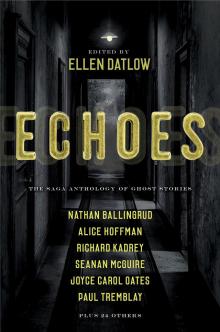 Echoes
Echoes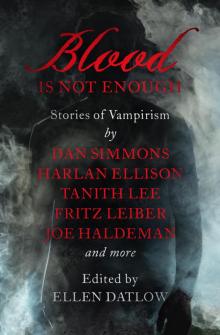 Blood Is Not Enough
Blood Is Not Enough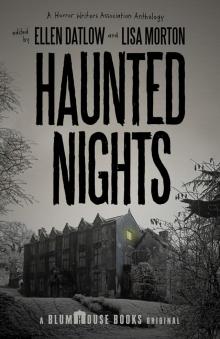 Haunted Nights
Haunted Nights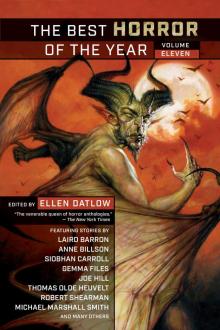 The Best Horror of the Year Volume Eleven
The Best Horror of the Year Volume Eleven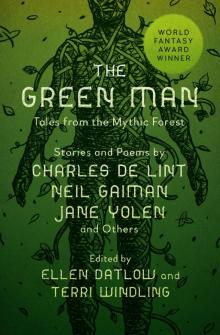 The Green Man
The Green Man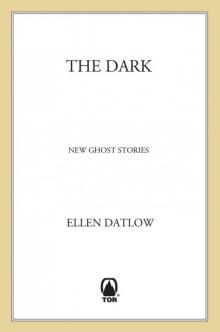 The Dark
The Dark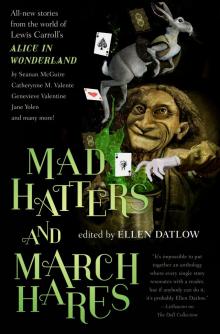 Mad Hatters and March Hares
Mad Hatters and March Hares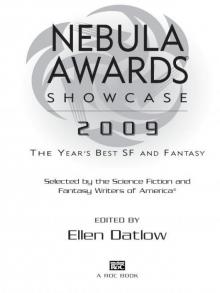 Nebula Awards Showcase 2009
Nebula Awards Showcase 2009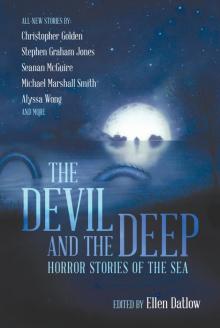 The Devil and the Deep
The Devil and the Deep